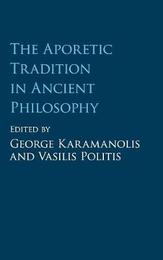
|
The Aporetic Tradition in Ancient Philosophy
Hardback
Main Details
| Title |
The Aporetic Tradition in Ancient Philosophy
|
| Authors and Contributors |
Edited by George Karamanolis
|
|
Edited by Vasilis Politis
|
| Physical Properties |
| Format:Hardback | | Pages:326 | | Dimensions(mm): Height 235,Width 157 |
|
| Category/Genre | Western philosophy - Ancient to c 500 |
|---|
| ISBN/Barcode |
9781107110151
|
| Classifications | Dewey:180 |
|---|
| Audience | | Professional & Vocational | |
|---|
| Illustrations |
1 Line drawings, black and white
|
|
Publishing Details |
| Publisher |
Cambridge University Press
|
| Imprint |
Cambridge University Press
|
| Publication Date |
28 December 2017 |
| Publication Country |
United Kingdom
|
Description
Ancient philosophers from an otherwise diverse range of traditions were connected by their shared use of aporia - translated as puzzlement rooted in conflicts of reasons - as a core tool in philosophical enquiry. The essays in this volume provide the first comprehensive study of aporetic methodology among numerous major figures and influential schools, including the Presocratics, Plato, Aristotle, Plutarch, Alexander of Aphrodisias, Academic sceptics, Pyrrhonian sceptics, Plotinus and Damascius. They explore the differences and similarities in these philosophers' approaches to the source, structure, and aim of aporia, their views on its function and value, and ideas about the proper means of generating such a state among thinkers who were often otherwise opposed in their overall philosophical orientation. Discussing issues of method, dialectic, and knowledge, the volume will appeal to those interested in ancient philosophy and in philosophical enquiry more generally.
Author Biography
George Karamanolis is Associate Professor of Philosophy at the University of Vienna. His publications include Plato and Aristotle in Agreement? Platonists on Aristotle from Antiochus to Porphyry (2006) and The Philosophy of Early Christianity (2013). Vasilis Politis is Associate Professor of Philosophy at Trinity College Dublin. He is the author of The Structure of Enquiry in Plato's Early Dialogues (Cambridge, 2015) as well as of numerous journal articles on philosophical enquiry.
Reviews'Questions ... are raised and answered in a surprisingly diverse, yet unified series of studies.' Lloyd Gerson, Journal of the History of Philosophy
|